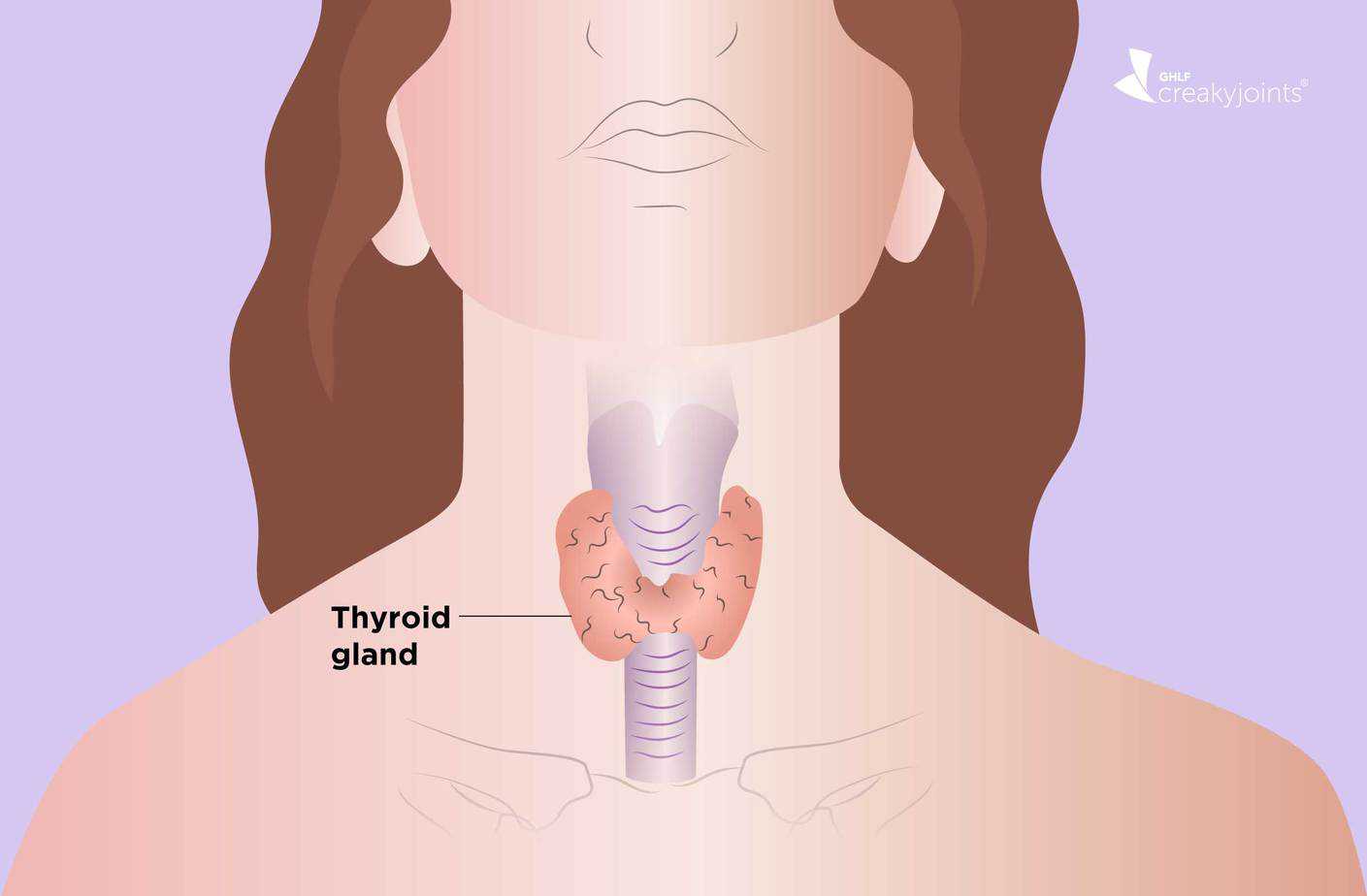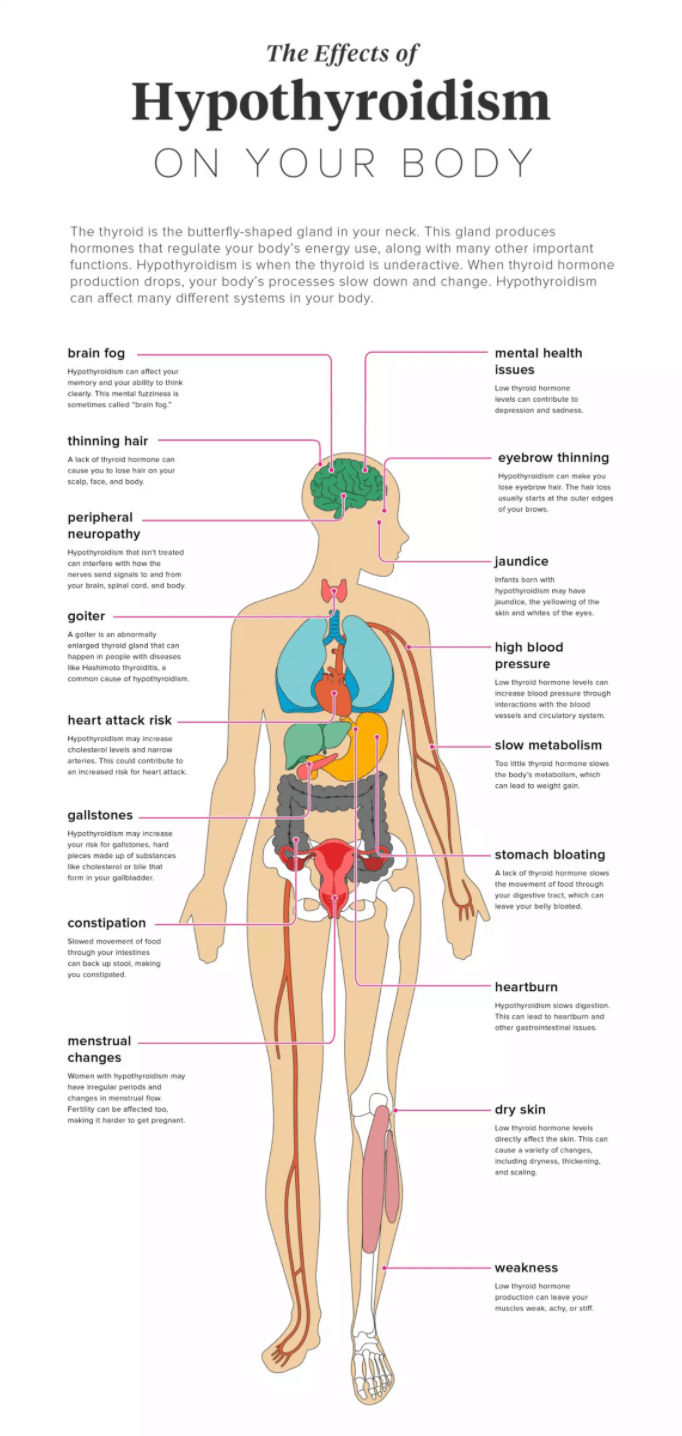We all have medical questions that we want answered – that’s why Dr. Amna Asif is here to provide us with her expert opinion! Every other week, she will be sharing her expert advice with us regarding a range of topics our followers are interested in learning more about. This week in Doc Talk, she talks about hypothyroidism. Read ahead to find out what exactly it is, what the causes and symptoms are, the myths and more:

What Is Hypothyroidism?
Hypothyroidism literally means “under-active thyroid”. The thyroid gland is located in the neck, near the base of the throat. It helps regulate hormones that control metabolism of the body, such as heart rate, blood pressure, body temperature, growth, weight and energy expenditure. The under-active thyroid gland leads to slowing down of the body’s metabolism.
Hypothyroidism is the most common thyroid disorder and affects about 10% of women. Men are also affected, but less frequently.
Hypothyroidism can be either primary or secondary. Primary hypothyroidism means that the thyroid gland itself is diseased, while Secondary hypothyroidism is caused by problems with the pituitary gland; the brain structure that supervises the thyroid gland.
The most common cause of primary hypothyroidism is the autoimmune condition Hashimoto’s disease.
Symptoms
Hypothyroidism can develop over many years with no symptoms. When symptoms do appear, they may be quite varied and can include:
- Tiredness
- Weight gain
- Being unable to tolerate the cold
- Puffy and pale face
- Brittle hair and nails, thinning of hair
- Dry skin
- Muscle pain
- Constipation
- Headache
- Poor attention span or memory
- Slow heart rate
- Heavy periods
- Depression
- Enlarged thyroid gland: Goitre
Some people can have symptoms of hypothyroidism without any abnormality in their hormone levels. Other times, these symptoms may have different causes. If you are concerned about any of these symptoms, see your doctor and discuss those problems.
The symptoms of hypothyroidism can be mild, moderate or severe. In its severest form (Myxoedema coma), hypothyroidism is potentially fatal and requires urgent medical intervention.
Causes Of Hypothyroidism
- Iodine deficiency in diet which leads to goitre (Enlarged thyroid gland)
- Hashimoto’s disease: Autoimmune thyroid disorder in which the body’s own immune system attacks and destroy thyroid gland
- Radiation therapy to neck
- Treatment for an overactive thyroid such as surgery that removes part or all of their gland.
- Medication: Such as Lithium and Amiodarone can prevent the thyroid gland from making the hormone normally.
- Birth defects: Congenital defect of thyroid gland
- Brain abnormalities: Pituitary or Hypothalamic disorders
- Pregnancy: Occasional cause

Diagnosis
Your doctor will examine your neck to see if your thyroid gland is enlarged or has nodules, and will look for other signs of hypothyroidism such as a slow heart rate. To diagnose hypothyroidism, a blood test is done which measures the level of your thyroid hormones.
Treatment
Iodine deficiency is easily relieved by increasing the intake of iodine through iodised salt, iodine rich foods or iodine supplements.
For other forms of hypothyroidism, your doctor will most likely prescribe you a medication called Thyroxine. This is a synthetic version of the hormone, and in most cases you will need to take it for the rest of your life. But do not start any medication without your doctor’s guidance.
Once treatment has begun, it may take some time to get the dose right for you. Further adjustments may be needed as time goes by, so your hormone levels will need to be checked regularly. Too little medication won’t relieve the symptoms. Too much medication can result in hyperthyroidism (resulting from too much thyroxin). It is important to see your doctor if you experience any symptoms of hyperthyroidism, including:
- Heart palpitations
- Unexplained and sudden weight loss
- Agitation and nervousness
- Increased sweating
- Insomnia
- Diarrhoea
- Intolerance to hot temperatures.
Myths Relating To Hypothyroidism
Myth: I can’t lose weight with Hypothyroidism.
Fact: If your medication dosage is correct and it brings your thyroid hormones levels to normal, it should not affect your ability to lose weight.
Myth: Taking extra thyroid tablets (Thyroxine) will give me extra energy and will make me lose weight.
Fact: Always take your thyroxine tablet as prescribed. Taking too much thyroxine can be life threatening and it does not give you extra energy or make you lose weight.
Myth: A lump or nodule in thyroid means I have thyroid cancer.
Fact: Only 5% of lumps in thyroid are cancerous, please see your doctor before reaching that conclusion.
Myth: I can manage hypothyroidism myself with salt, diet and iodine supplements.
Fact: No, every thyroid disorder is treated differently. Self treatment can be harmful. Please discuss with your doctor and follow their advice.
Myth: If I have thyroid problems, I will develop a goitre (enlarged thyroid gland).
Fact: No, majority of people with thyroid disease do not develop goitre.
Myth: Hypothyroidism can be easily diagnosed and managed.
Fact: It is a complex condition and requires expert management.









What do you think?
You must be logged in to post a comment.